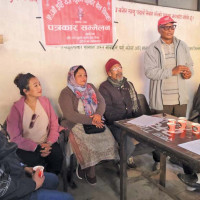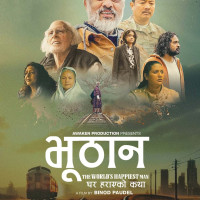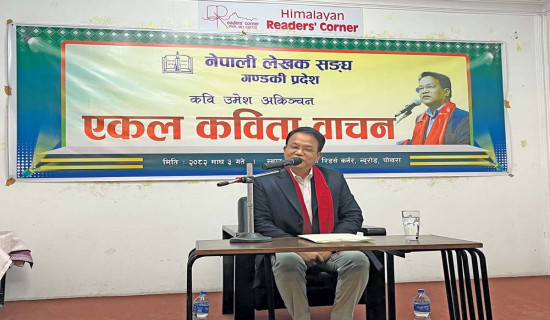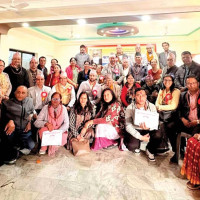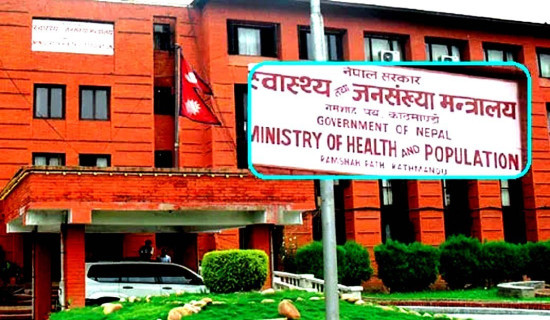- Friday, 23 January 2026
Manoj Bahadur Gurkha spreading Nepali culture in Bangladesh
Kathmandu, June 19: Manoj Bahadur Gurkha, a Bangladeshi of Nepali origin, has been residing in Bangladesh for seven generations, diligently preserving the Nepali language, art, culture and lifestyle.
Recently, he embarked on a journey to Nepal to seek out his ancestral home in Gorkha, where he visited the Majhi settlement.
He shared his profound love for Nepali soil, music and culture with The Rising Nepal in a detailed conversation.
Manoj Bahadur and his family live in the Rangamati Hill District of Bangladesh.
According to him, there is a settlement in the Rangamati Hill District called Majhi, where approximately 30 households of Nepali origin live.
Manoj Bahadur has made significant contributions to music, having composed over 1,000 songs in the Bangla language over his 50-year career.
Talking to The Rising Nepal, he shared that they had no existence in Bangladesh, but now the government of Bangladesh has accepted the Gorkha community as one of the indigenous communities.
This recognition marks a milestone in the gradual rise of Nepali art and culture in Bangladesh, said Manoj Bahadur.
“Art and culture are very powerful, which help me to flourish,” he said.
Manoj Bahadur recounted that in 1871, in the Chittagong region of Bangladesh, the ‘Kuki,’ a group of many indigenous people, revolted against British rule. The Kuki community did not allow the British rulers to enter this area. In response, the British rulers established the 2nd Gorkha Regiment in the Chittagong region, bringing them from India to control the Kuki. The British government then brought Nepali families and settled them in the area.
Manoj Bahadur claimed that they are the second generation of the Gorkha families established by the British government in Bangladesh.
They have been living in Bangladesh for seven generations.
“I am not Nepali because I don’t hold Nepali citizenship. I am of Nepali origin but a Bangladeshi,” he said. However, he had been invited by the foreign affairs department when former President Bidya Devi Bhandari visited Bangladesh. He sang a song at the programme as a Nepali-origin Bangladeshi during the former president’s visit. He was also invited to the president’s residence in Nepal, where he had a chance to meet the former president twice.
Despite living in Bangladesh for seven generations, Manoj Bahadur still manages to speak Nepali very well and wears the Nepali ‘Dhaka Topi’.
Even though he is Bangladeshi by citizenship, he is very passionate about connecting with his roots.
“If those who do not connect with their roots, they are not perfect. To be a perfect human being, they have to connect with their roots,” he said.
He also urged the government to help people connect with their roots.
“Music is a very powerful tool to develop and connect,” he added.
He is famous among the Nepali and Nepali-origin communities through his music. He believes that this is the turning point for Nepali music and that with its development, they must maintain the originality of Nepali music.
He said that he has sung around 100 songs in Nepali language so far.
Manoj Bahadur’s passion for his heritage and his contributions to Nepali culture make him a significant figure in both the Nepali and Bangladeshi communities.
To further nurture his love for Nepal and his ancestral land, he is currently writing a book about the prehistoric era of Nepal, covering prehistoric to the present day.
The book will be focused on Nepali dynasties and religious and cultural heritages.
Initially, the book will be written in Bangla and later will be translated into English, he added.
He noted that many Bangladeshis are unfamiliar with Nepali history, so he aims to share this knowledge with them.
Additionally, he is set to release a new Nepali song titled ‘Danda Pakha Ghumadai Hidne,’ written by Niti Raman Gautam from Jhapa, Nepal soon.

.jpg)


